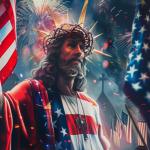by C J Rhodes
To be sure, Dr. West has been much maligned since his public opposition of America’s first black president elevated to a feverish pitch. There has been speculation as to why West has been so hard on President Obama: is this the ardor of a prophet or the angst of a wannabe HNIC? Who knows whether either or both serve as motivations for West’s consistent criticism of Obama. I will say that regardless of the reasons behind the rift, West has indeed been consistent in critiquing presidential power and the lack of moral constancy; he was an adamant critic of Raegan and Bush and even Clinton, so why would he relent now?
I still find West to be an enlightening public intellectual, his controversial contentions with President Obama notwithstanding. I remember when he served as the keynote speaker for the University of Mississippi’s Black History Month one year while I was a student there. Meeting Dr. West in a small, intimate student gathering before his talk was the highlight of my collegiate experience. I long admired him as a thinker, orator, and author and in some ways wanted to emulate this funky philosopher. In a brief, one-on-one exchange following his presentation he instructed me, then a young philosophy major, to look into PhD work. Though I didn’t take him up on that (going to divinity school instead) I was convinced soon thereafter that there is something affirming about the life of the mind and its implications for making the world better. As a pastor and theologian, I am still convinced that we need more men and women of faith, hope, and love writing, reading, advocating, and agitating for a soul-searching transformation of both self and society.
In last night’s interview, Dr. West said something that jumped out at me like a 3-D image. He described himself as a “Jesus-loving, free black man.” I quickly looked up the phrase and discovered that he’s said this of himself in several other settings. As I pondered the phrase, I thought of it as a fitting self-description for me also, although in a way that slightly differs from West’s definitional content.
For a while I have tried to sum up in simple language my theological and political and cultural impulses in a time that demands simplistic idenity brands. I’m often frustrated by how easy it is for people to shut down conversations with others based on left-right, in-out binary (il)logic. And I know I don’t comfortably and neatly fit into such standards. Much like many Americans, I lean to the left or to the right, or stand at the center, or on the radical periphery depending on the subject.; I’m more purple than I am red or blue. My worldview is much more fluid than what is allowed in a sound byte, 140 characters or less climate and culture.
But since these are the times in which we live, to consider myself a “Jesus-loving, free black man” suits me just fine (at least for now).
The placement order of the words is powerful and necessary. Jesus-loving. Free. Black man.
I’m first and foremost Jesus-loving. I’m not ashamed to say that I love and follow (though imperfectly) the God of the universe who became Jewish flesh in first-century Palestine, who lived a sinless and just life, who was crucified, died, was buried, and on the third day rose from dead in accordance with the Scriptures. His Gospel and his Kingdom have oriented my whole life since I encountered him in my late teens. Since that time my life has been a journey with Jesus, a journey filled with wonder and sometimes with doubt but mostly joy. The Jesus of history and the Jesus of faith yet forms my life and calls me to live in ways that I could not live without his grace and Spirit. Everything I am and hope to be is invigorated by the life I now live in him.
Because I’m Jesus-loving, I’m also free. I seek to think and act in ways oriented toward the way I understand who Jesus was and is and will be. I love—and learn from— my enemies and friends. I gain wisdom from diverse sources, reading the Scriptures in one hand and the culture in the other. I am therefore free to celebrate the truth when articulated by someone I generally don’t agree with, and challenge those people I genuinely respect. I can sit down with a person of another faith or of a differing political persuasion and love their humanity enough to listen to them even as my own convictions may allow me to disagree vigorously on this or that point. That has made me the odd man out many times because I’m okay withthinking first and reacting later. And I’m increasingly okay with not everyone understanding or liking me because of that.
Lastly, I’m a black man in a white world. My identity in Christ is an “already-and-not-yet” identity. I know that I have been raised with Christ and am now seated in heavenly places with him. Yet I also know that much of America exists on the other side of the cross, the wrong side. A new creation has begun in Jesus, but our reality is still clouded by the god of this age. As such, I know that, negatively, I’m a black man who is more likely to be criminalized, stigmatized, marginalized, and objectified in a nation still dominated by white supremacy. I know that in many instances I or my family will be first judged by the color of our skin before we are judged by the content of our character. And as a black man I know that no matter how much I love and respect my sisters, I will never fully walk in and understand their joy and pain. I know all of this because I experience if not daily, certainly weekly.
But, positively, I also know my story and the story of my people, not just the story that includes slavery and lynchings and Jim Crow and oppression. I also know a story in which we have
collectively loved in the face of hate; danced and sung when our bodies were being dehumanized; shouted creativity and the made a way out of no way when hog intestines and straw brooms were all we had. I know of kings and kingdoms, wise women and wonderful works. I know of a story of triumph in the face of tragedy. I know that, too, because I imbibe it daily.
As a confessional and convictional Christian, I am still seeking how to articulate how this Gospel changes everything even as it has changed me. Thank God I am free enough to do so.
I’m a black man in America who is free to think for himself because I love Jesus…because he first loved me.
Follow C J on Twitter @RevRhodes
















